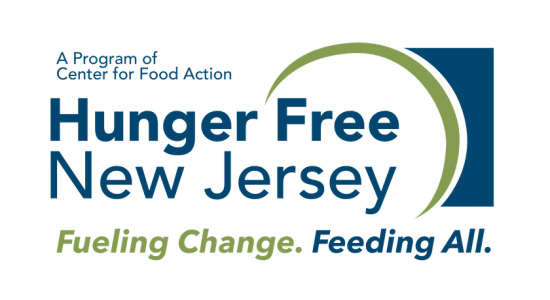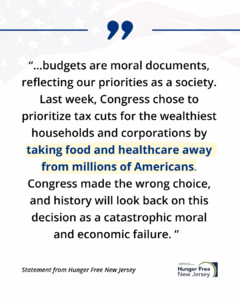Director Adele LaTourette gave lawmakers an update on school meals and other child nutrition program participation during a Senate hearing on Monday.
Following is a copy of Adele’s testimony.
To: Senate Education Committee Chairwoman Teresa M. Ruiz and committee members
Fm: Adele LaTourette |Director |Hunger Free New Jersey|
alatourette@cfanj.org | (201) 569-6571
Re: Access to Child Nutrition
Good morning Chairwoman Ruiz and members of the committee. Thank you for addressing the critical issue of childhood hunger and for inviting Hunger Free New Jersey to comment today.
Federal child nutrition programs are one of the most effective tools in our mission to reduce childhood hunger. Hunger Free New Jersey leads the New Jersey Food for Thought Campaign. The campaign’s goal is to reduce childhood hunger by maximizing participation in three key programs — school breakfast, summer meals and afterschool meals.
Maximizing participation not only feeds hungry kids, it brings more federal dollars into our schools and communities to support anti-hunger efforts. New Jersey participation in these three programs has historically been lower than national benchmarks and remains so.
In recent years, however, we have made strong progress. But there is still a long way to go before we are reaching the recommended percentage of low-income children. I’d like to provide a brief overview of the status of these programs and the steps we, collectively, are taking to increase participation.
School Breakfast
From 2010 to 2018, school breakfast participation has soared 65 percent. This is the strongest achievement on the child nutrition front in decades and means that school districts have doubled the amount of federal dollars they claim for school breakfast, reaching $110 million in FY 2019.
Despite this strong progress, we are still failing to reach nearly 300,000 low-income students with this important nutritional start to the school day.
In fact, we lost ground from 2017 to 2018 when participation fell slightly. We expect to see this trend reverse, thanks to the legislative mandate requiring high-poverty schools to serve breakfast as part of the regular school day, similar to lunch. Under the mandate, 648 New Jersey public schools were required to serve breakfast after the bell beginning in September 2019.
It is very important to understand that the unserved students are already enrolled in the federal School Breakfast Program. The problem is not enrollment. It is that too many schools continue to serve breakfast before school when most students haven not yet arrived. Breakfast after the bell makes the morning meal available to all students, reducing stigma and substantially boosting participation.
Right now, Hunger Free New Jersey is analyzing breakfast participation data to determine the first-year impact of that legislative mandate. We expect to see at least a modest increase in 2019 and a much more dramatic one in 2020. We would welcome the opportunity to appear before the committee once we have the results of that research.
Summer Meals
The federal Summer Food Service Program provides meals to children in the summer when school is out and hunger sets in for many children who rely on school meals during the academic year.
We have achieved strong progress on this front, too. New Jersey communities served summer meals to more than 103,000 children on an average day in July 2018. That represents a 38 percent increase since July 2015 and a 71 percent hike in federal reimbursements, rising to $12.7 million in 2018.
Again, this is great progress but there is still more work to do. We expect to see tremendous impact this summer from the legislative mandate that high-poverty districts participate in the Summer Food Service Program. The legislation allowed for a waiver last year, which most districts opted for. But all affected districts must participate this summer.
To ensure successful implementation, we held three summer meal summits last fall to educate school officials about the program and introduce them to potential partners, such as food banks, that can help them build strong summer meal programs. And we continue to work in communities, such as Jersey City, New Brunswick and Atlantic City, to bring the community together to bridge the summer nutrition gap.
We will be closely tracking and reporting on progress in our annual summer meals reports.
Afterschool Snacks and Suppers
Afterschool suppers are another important tool in reducing childhood hunger. This relatively new addition to the menu is a growing option for many New Jersey children.
From 2016 to 2019, the number of children served dinners rose 34 percent, translating to nearly 24,000 children receiving this meal each day in afterschool programs operated by schools, community organizations and local governments.
In March 2019, communities served nearly 485,000 suppers to children who might otherwise go home to an empty dinner table. These communities collected $1.8 million for snacks and suppers served in March alone.
We also continue to work in communities across the state to raise awareness of this program, help local officials navigate the logistics of serving afterschool snacks and supper and publicizing the program to parents and other caregivers. We are optimistic that we will continue to make strong gains on this front in 2020 and beyond.
I’d like to leave you with one number: 99 million dollars.
That is the additional amount that New Jersey communities would collect each year in federal reimbursements if we achieved the Food Research & Action Center’s recommended benchmarks of reaching 70 percent of students with breakfast, 40 percent with summer meals and 15 percent with afterschool suppers.
We have included a chart in the testimony we provided that provides a breakdown of participation and federal dollars claimed — and unclaimed — for all three programs.

Note: Additional dollars for summer meals only counts July, so total will be higher when June and August are factored in. That data were not readily available.
With legislative and administrative support and the willingness of local communities to work together to feed children, we can achieve this goal and make tremendous strides in reducing childhood hunger in the Garden State. Thank you again for the opportunity to testify.



